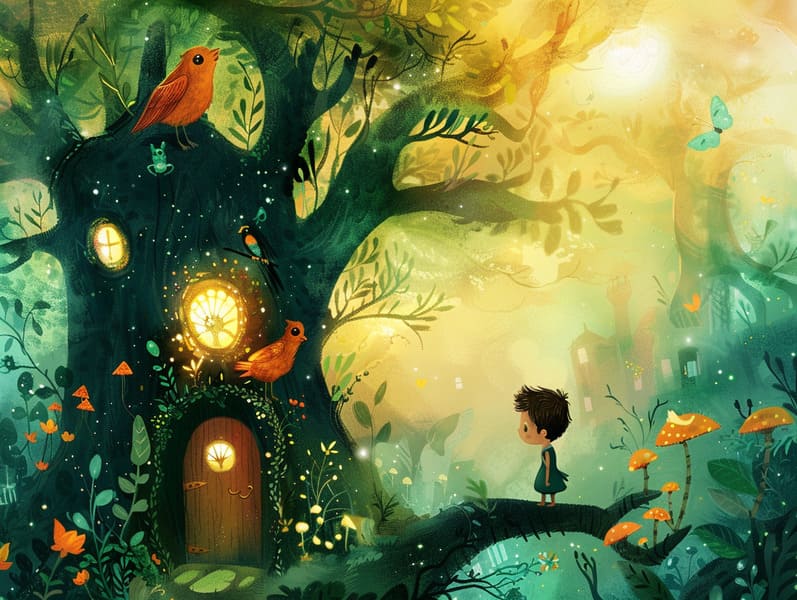
The end of the day is a sacred time for parents and children. It’s a opportunity to calm down, snuggle, and enjoy the wonder of nightly stories.
For decades, evening stories for little ones have been a esteemed ritual, offering more than just a way to rest. They provide an occasion for bonding, growth, and stimulating inventiveness.
The Importance of Bedtime Stories
Evening stories for little ones are not just a way to complete the day. They play a significant role in a child’s maturation and in fortifying the caregiver-child relationship. Here’s why they matter:
1. Quality Time: Reading together at bedtime develops a special loving connection between parents and children. It’s a moment of intimacy that helps children feel important and secure.
2. Speech and Language Skills: Absorbing tales helps children develop their speech skills. They pick up new expressions, understand construction, and boost their comprehension and analytical skills abilities.
3. Imaginative Skills: Narratives for little ones take them to dreamy worlds, stimulating imagination. They visualize characters, settings, and adventures, which sparks their creativity.
4. Emotional Growth: Stories for little ones often depict characters facing challenges and sentiments. These accounts help kids handle and navigate their own feelings, encouraging emotional intelligence.
5. Brain Growth: Paying attention to a narrative helps children develop mindfulness, retention, and thought processes. They enhance to follow lines of thought, remember elements, and guess endings.
Establishing Bedtime Story Rituals
Building a nightly ritual that has sharing tales is effortless and fulfilling. Here’s how to develop a beloved part of your sleep-time routine:
1. Pick a Cozy Area: Pick a comfortable place where you and your child can snuggle up without noise. A cozy bed or a peaceful reading nook works beautifully.
2. Set a Regular Time: Establish a routine time each night for tales. Predictability helps children anticipate and makes the practice more sustainable.
3. Choose Suitable Stories: Pick tales that are tailored to your child’s age. Small children might be drawn to visual books with straightforward tales, while elementary kids may like books with chapters with more complicated tales.
4. Engage with the Story: Ensure the tale feel vivid by doing different voices and accents, adding audio effects, and encouraging your child to take part. Ask details about the story to involve them.
5. Set a Tranquil Atmosphere: Adjust the lights, use soft voices, and create a soothing environment to help your child relax.
Finding the Best Bedtime Stories
There are varied options where you can find wonderful bedtime stories for children. Here are some ideas to think about:
1. Kids’ Books: Explore your local library or bookstore to find a broad selection of bedtime stories for kids. Going through the shelves together can be a delightful activity that also helps children to get stories that they enjoy.
2. Internet Sources: There are many sites that offer free bedtime stories. Sites like kids' story platforms provide a variety of short stories for kids that you can read online. These resources are great for finding new and unique stories without paying.
3. Apps for Storytelling: For nights when you’re too drained to read, try audiobooks or storytelling apps. These can provide a quiet narration to read your child a story, ensuring they still get their bedtime story fix. Apps often offer interactive parts that can engage children further.
4. Personalized Stories: Write your own stories matching your child’s hobbies. Personalized stories can be especially engaging and meaningful. You can include your child in the narration process, making them a part of the adventure.
Why Short Stories Are Great
Brief stories for children are especially effective for bedtime. They provide all the benefits of longer stories but are more compact, making them perfect for relaxing before sleep. Here’s why short stories are a good choice:
1. Simple to Understand: To-the-point tales are straightforward and clear for little ones to understand, even after a long day. They can speedily grasp the tale and enjoy the story without getting lost.
2. Fast Engagement: These stories readily engage children, seizing their attention and creativity. This makes them excellent for keeping bedtime traditions simple yet enjoyable.
3. Various Options: Short stories allow for variety in your bedtime reading. You can choose a different story each night, keeping the tradition engaging and exciting for your child.
4. Manages Time Well: For busy parents, quick stories are a time-efficient way to verify children still get their nightly dose of storytelling. They fit well into a busy schedule while still offering the full benefits of a bedtime story.
The Effectiveness of "Read Me a Story"
The simple phrase, “Can you tell me a story?” can offer a world of magic for children. Agreeing to this request not only addresses a child’s check it out request for attention and engagement but also builds lasting times. Here’s why it’s enchanting:
1. Relationship: Sharing stories to your child encourages a deep emotional connection. It’s a time for togetherness, sharing, and bonding.
2. Practice: Creating a bedtime story routine creates a beloved tradition that children expect every night. It’s a routine that can be handed down through generations.
3. Development Together: As you tell stories, you’ll observe your child’s growth and maturation. Their queries, reactions, and understanding of the stories progress, offering insights into their developing minds.
4. Comfort Zone: Bedtime stories provide a safe space for children to explore emotions, face fears, and find comfort in the known presence of a parent.
In Closing
Kids’ bedtime stories are a valuable tool for developing a child’s maturation and establishing unforgettable memories of closeness.